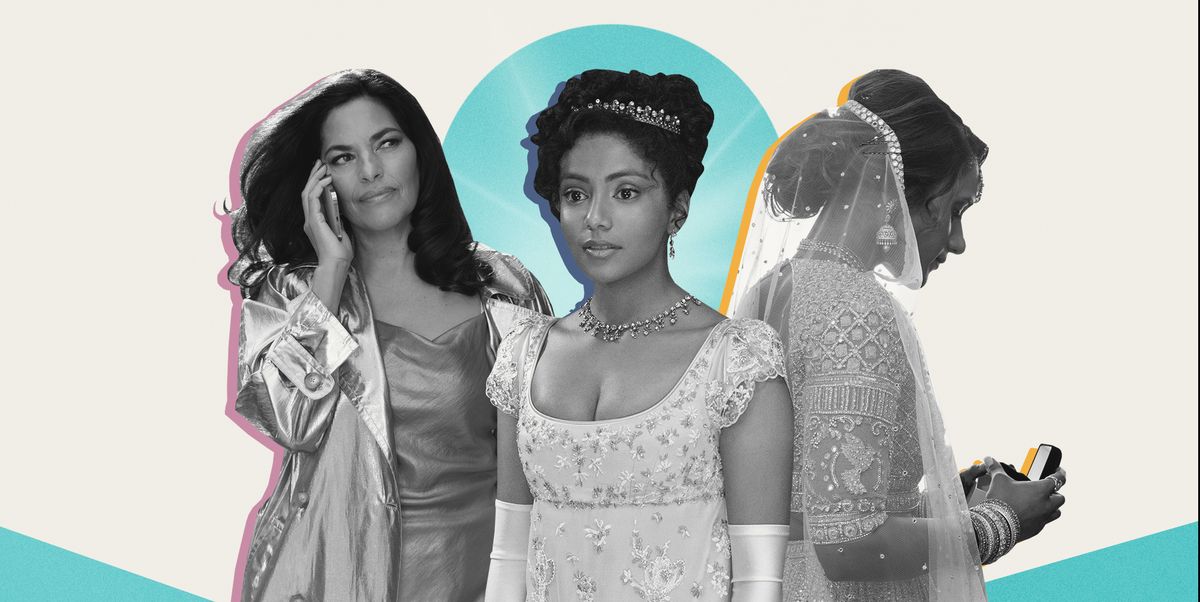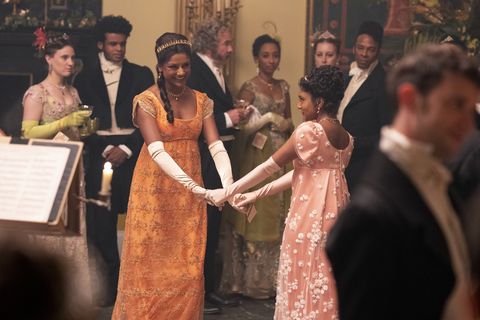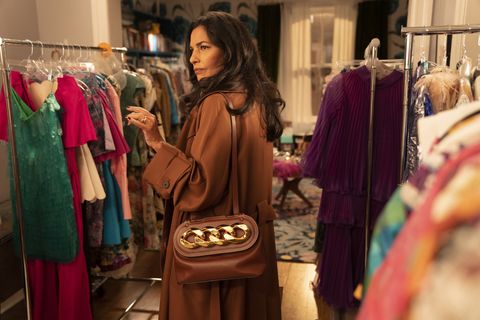There’s a scene in the finale of Bridgerton’s second season that features its newest cast members, Kate and Edwina Sharma (Simone Ashley and Charitha Chandran), as they explore what it means to know—and choose—yourself.
“I am done with playing a part. I want to know myself truly and to know who you are, too. Because I am not sure I like the young ladies we have both been playing,” says Edwina. “Whatever action you now wish to take, I only hope it is because you are being truthful to yourself—and not because of anyone else.”
For me, a South Asian viewer—and, I imagine, so many other South Asian women watching as well—there’s an unspoken significance to the interaction, so apparent it’s like a third character in the room. It feels like, in that scene, two South Asian women (even in Regency-era England) are finally beginning to confront all the barriers that exist between them and their abilities to choose themselves: The cultural pressures, the passive stereotypes, and all the ways they internalized both. Because thanks to those factors, South Asian women don’t always have the luxury of redefining or pursuing their own paths to happiness…at least not without struggling under the tremendous weight of expectations placed on us.
Despite that, they’re doing it—at least on TV right now. Earlier this year, we watched Deepti Vempati, a Love Is Blind cast member of Indian descent, leave her fiancé, a man who repeatedly expresses that he’s not attracted to her, at the altar. “I’m choosing myself,” Vempati declares, and with those three words, launches herself into feminist icon status. Audiences go wild: Shortly after the episode’s airing, Vempati had amassed over a million Instagram followers, making her the show’s clear breakout star.
There shouldn’t be anything radical about a woman demanding more than a partner who doesn’t desire her—yet, the sight of a South Asian runaway bride feels so unexpected, almost revolutionary. Vempati, like the Sharma sisters, does the thing no one expects her to do: She rejects the notion that South Asian women need to be sacrificial and accommodating and traditional. She shows us that we don’t need to settle or make the choice that keeps everyone else happy. And clearly, that resonates in a big way.
On And Just Like That, we meet Seema Patel (Sarita Choudhury), who is hardly the first character in the Sex and the City universe to choose a nontraditional path of womanhood, but is doing so while navigating the family dynamics of her Indian American household. We instantly learn that Patel, independent as she may seem, still lives with the need to please her parents. Ultimately, her decision to live unmarried and childless, on her own terms and timeline, seems to win out. But clearly, that choice doesn’t come without an internal struggle. The fact that her white counterparts didn’t have a similar conflict with their own families reflects how South Asian women have a harder time defining their own wants. And despite the show’s accusations of stereotyping, it’s still relatable to see Seema in this position.
According to South Asian therapist Neha Darji, MS, LPC, who practices at We Rise Therapy and Wellness, this internal conflict feels very true-to-life and mirrors many of the issues her South Asian clients grapple with as they work to define what they really want and need.
“South Asian culture is [built] on sacrificing your own needs for the larger group. Growing up with ancestors who are kind of passing this on, this collectivism, this sacrificing of your personal needs, [it’s something we really internalize], especially for children of immigrants who are growing up in this very individualistic society,” says Darji. “Now more than ever, Millennials are more educated, more independent, they’re more independent in their thoughts, their lifestyles, their autonomy—there’s a big clash and conflict between those two ideas. That’s why we call ourselves cycle breakers.”
For children of South Asian immigrants, who saw themselves reflected neither in Western media nor in Bollywood films for so long, watching women like Kate, Edwina, Deepti, and Seema gives us the chance to challenge long-held notions of what it means to prioritize our own needs. It allows us, at long last, to feel seen.
“[Watching these women] choosing themselves definitely normalizes and validates the South Asian experience, especially for women children of immigrants,” says Darji. “It sets the stage and tone for creating new norms of identity development and makes women who are also struggling with similar internal challenges feel their struggles are also valid.”
“I think this is just the beginning of the challenges, though, and the biggest challenge South Asian women face when thinking about ‘choosing themselves’ or pushing past barriers are controlled by feelings of guilt and shame, and fear of not being able to cope with the aftermath of choosing themselves, [or] not having community or support,” Darji adds.
That pressure to be selfless doesn’t just come from within our culture; we also need to talk about the ways South Asian women are stereotyped from outside their communities as well. “People tend to see Asian women as passive and accommodating and sweet. There is this expectation that they’re going to [behave] that way,” says Darji, who believes this affects how we are perceived both socially and in the workplace. “[Because of that] we’ve kind of internalized this identity.”
South Asian women may even struggle to identify what it is they actually want. “Working with South Asian women, [I’ve realized] they’re not really taught to acknowledge their own feelings, and even identify what feelings are,” says Darji. “Those feelings kind of swirl in them over time. [Emotions like guilt and shame] just become a part of who they are, which is really damaging to their identities.”
Because South Asian women are expected to fill their roles as daughters, sisters, wives, mothers to perfection, they’re often so consumed with doing what’s best for their families and communities. We’re seeing that reflected in these onscreen characters: Kate Sharma spends a lifetime protecting and prioritizing her younger sister, who in turn twists herself into the image of a perfect society woman. Deepti Vempati tries to tell herself that she can accept a basic lack of chemistry in a marriage. Seema Patel is 53 years old and still lying to her parents to make them happy. And recently, South Asian multi-hyphenate entertainer Lilly Singh spoke about her own experience with defining and choosing her own wants, too. “I’ve never actually had an original thought about what I wanted in life,” she said during an appearance on The View in April. “I’ve always done what my parents, or what society, or culture, or school told me to do…I don’t think I have a strong foundation of what I want and where I want to go in life.”
It all feels terribly, terribly relatable—and it offers South Asian women a chance to look at their realities from outside themselves. Twenty years ago, Bend it Like Beckham explored what it’s like for South Asian teens caught in between cultures. But we’ve almost never seen South Asian women work through the expectations and the pressures and the stereotypes in such authentic ways until right now. Most of us have never heard things like “You’re an adult, you can do what you want” from our families. For those of us who enter adulthood as minorities and children of immigrants, being surrounded by people who are universally encouraged to make their own choices while we are not can create very real identity issues. It can make us wonder why everyone else seems to have such a clear picture of who they are, while we struggle to pinpoint where the internalized expectations end and our own wants begin. And how can you choose yourself if you don’t know which choices are actually your own?
It isn’t even so much about South Asian women choosing themselves on our screens—it’s about how they’re doing it, and what that really says about all the barriers we face. By seeing the struggle reflected on our screens, we can finally confront it. And maybe we’ll even give ourselves permission to define our own choices in the process.
This content is created and maintained by a third party, and imported onto this page to help users provide their email addresses. You may be able to find more information about this and similar content at piano.io




